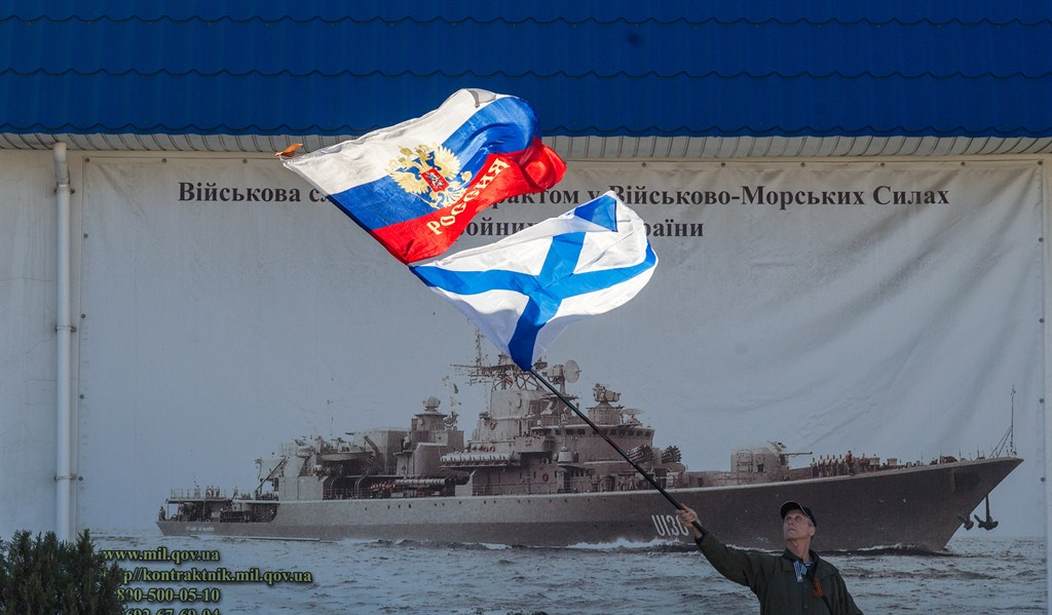The Russian Black Sea Fleet may have just lost another ship to the Ukrainians. "Ukrainian intelligence says seven people have been killed and six more injured after a Russian patrol ship was hit and sunk in a sea drone attack," the BBC is reporting. "The Sergei Kotov was allegedly hit in the early hours of Tuesday morning." The Kotov is a Project 22160 patrol ship belonging to the Russian Navy. From Wikipedia:
The vessels are primarily intended for duties such as patrol, monitoring and protection in open and closed seas ... The class's armaments include the Kalibr-NK cruise missile, the AK-176 76.2 mm dual-purpose naval gun, aerosol camouflage, two grenade launchers, and two machine guns. The class has a helicopter deck and hangar for one Ka-27 or Ka-226 helicopter, a landing speedboat, and provisions for drones, underwater unmanned craft, and unmanned boats
Given this latest loss in addition to previous casualties, can the Russian Black Sea Fleet still project to the Mediterranean? Can it still claim local maritime superiority in the Black Sea versus Ukrainian area-denial arms? Perhaps most importantly, does combat in the Black Sea foreshadow the course of potential conflict in the Red and South China Seas? While the open oceans are still probably the domain of traditional navies, the littorals may soon be contested by Ukraine-like forces based ashore. As an Australian defense publication noted:
Forces projecting power from the sea must traverse these dangerous spaces; spaces made more dangerous if adversaries hold the surrounding islands or landmasses. This is because the advent of long-range precision missiles has the effect of negating the gaps within archipelagos where surface ships cannot be affected from the land. In fact, an inversely proportional relationship will occur: the smaller the geographic space between littorals, the greater the strategic importance such space holds. Countries on either side of these commercial and military chokepoints hold a profound geographic and strategic advantage. During hostilities, these strategic spaces must be defended against use or interdiction by enemy forces.
— Australian Army Research Center
Right now NATO is fighting its own littoral war against the Iran-backed Houthis in the Red Sea. "Some 12 percent of the world's trade passes through the Red Sea. Anything that interrupts shipping there has potential global ramifications," RAND notes.
Attempts were made to protect shipping from Houthi militants before the recent air strikes, such as the U.S.-led Operation 'Prosperity Guardian' and actions by allied naval vessels, but so far they have not been enough. While U.S. and allied naval vessels have successfully shot down numerous Houthi missiles and bomb-laden unmanned aerial vehicles (UAVs) over the past month, they have failed to reduce the threat to a level deemed acceptable to most shipping lines ...
One way to achieve an acceptable risk level is through organising convoys: a standard procedure during the world wars. Because the structure already exists in Suez Canal convoys, a similar system could potentially be coordinated, extended, and provided with the necessary naval protection before entering the Red Sea ... We do not know what will happen next or what it will mean for global trade, but the vulnerability of one of the world's most important maritime trade routes is not going away any time soon, nor is the need for naval protection.
Even convoys are no sure guarantee. Despite the presence of a Western naval escort, the Houthis have managed to sink two civilian ships, kill several sailors, and root up a number of vital undersea communications cables linking the Middle East and points east.
But no littoral is more potentially important than the South China Sea. "The annual trade passing through the South China Sea accounts for more than 60 percent of global maritime trade, more than 22 percent of total global trade, and one third of the global shipping." The littoral states that enclose it are China, Taiwan, the Philippines, Malaysia, Brunei, Indonesia, and Vietnam. At the rate things are going, there's likely to be real tension in the area.
The Chinese blockade of Philippine outposts like the Sierra Madre wreck is becoming more and more kinetic. Beijing's vessels are inflicting significant material damage on the fragile Philippine ships attempting to resupply that impoverished country's tenuous outposts. China is relentlessly expanding in the area. Unless things change, it will come to a bad end. The mystery is why. China relies more than any other power on shipping its exports and vital imports through this narrow sea. Turning it into a combat zone would hurt everyone to some degree but it would utterly destroy China. But if there's anything we should have learned from the Ukraine war, Gaza, and Woke behavior, it's that ideology, delusion, and hallucination beat rational self-interest in some actors any day of the week. Things don't have to make sense to happen.
Thus events in the Black Sea, Red Sea, and South China Sea may foreshadow the future of naval conflict in the 2025+ era. The Age of the Littoral: the revenge of the land upon the sea.










